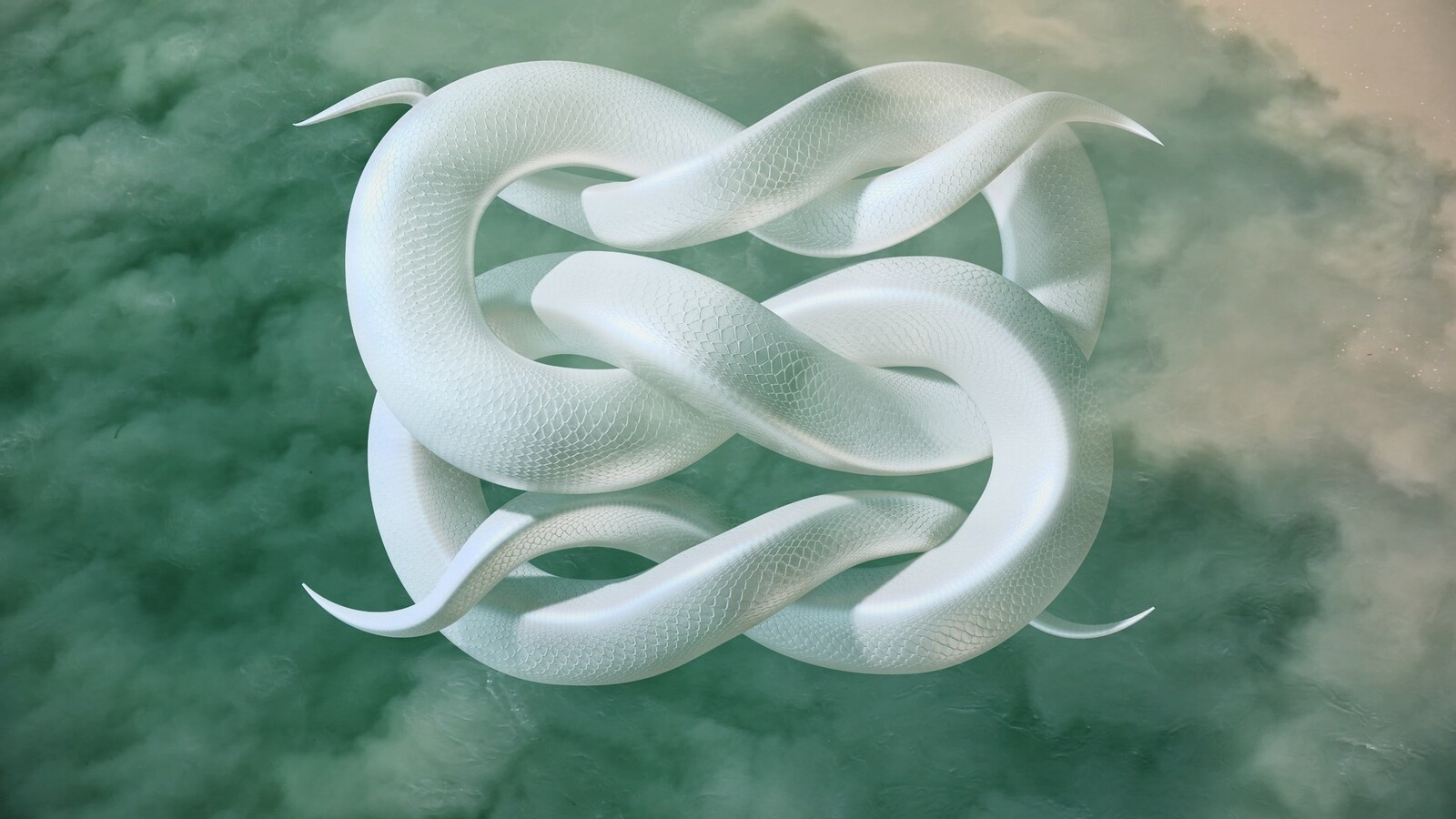The Goddess Helix
May 31–September 1, 2024
Kongens gate 2
7011 Trondheim
Norway
Hours: Thursday–Friday 2–6pm,
Saturday–Sunday 12–4pm
T +47 485 00 100
office@kunsthalltrondheim.no
The Goddess Helix weaves together a multi-year cycle of ongoing artwork by Emilija Škarnulytė to create the first comprehensive survey of this series. Comprising film, sculpture, and holographic imagery, the exhibition highlights three interlaced cinematic installations drawing on the research of Marija Gimbutas (1921–94), a Lithuanian anthropologist who interpreted the prominence of goddess and serpent motifs in Neolithic art. Within this film series, Škarnulytė embodies a mythic guise—part-human, part-aquatic animal—guiding spectators through the currents of contemporary existence. Two pivotal artworks bookend this series: The Code (2024), a newly commissioned twinned-animation portraying pythons metamorphosing from sigils into a genetic sequence, and Aldona (2013), a poignant homage to the artist’s grandmother, who is a foundational pillar of Škarnulytė’s own journey. Exploring themes of adaptation, survival, and myth, these collected stories seek to inspire new means of navigating environmental and social crises amidst growing disillusionment.
In the artist’s work, a quest for meaning entwines scientific inquiry with artistic creation. These mirrored streams of human endeavor flow like two rivers stemming from the same source: the desire to depict and understand the world. Škarnulytė’s three chimeric characters traverse three major bodies of water—the Amazon, and Rhone rivers, and the Arctic Ocean—and concurrently dive into humanity’s collective failure to adequately respond to escalating global crises such as increased conflict, climate change, and the erosion of community. Viewers follow these prophetic hybrid beings through diverse visual perspectives, unveiling broader interconnections between natural and artificial landscapes, and exploring the interplay between human and non-human interactions across different scales.
Oracles, though elusive, serve as guides throughout the exhibition, offering as many meandering paths as they do answers. The paradoxes they raise seem imaginary, but as the poet Muriel Rukeyzer noted: ”the universe is made of stories, not atoms”. Politics and science also rest on riddles, and their own lore directly conditions the lived lives of individuals. In turn, Škarnulytė’s fabled narratives shadow and reconceive the authority of such “atoms”, and call for us to rediscover ourselves in how we care for, perceive, and exist within the planet, its ecosystems, and the cosmos. The narrative device of her folkloric creatures and guides adeptly performs as a vector, delicately peeling back the myths surrounding the stories we create and rely on to navigate life.
Emilija Škarnulytė (b. 1987), a Lithuanian-born artist and filmmaker, works at the intersection of documentary and speculative fiction. Her video works lead viewers through decommissioned nuclear power plants, forgotten underwater cities, and uncanny natural phenomena. Within these eerie sites, where humanity intersects with the non-human, Škarnulytė delves into the myths and remnants of modernity.
Škarnulytė was awarded the 2023 Ars Fennica Award and the 2019 Future Generation Art Prize. Her recent exhibitions include presentations at the Gwangju Biennale in South Korea (2023), the Helsinki Biennale in Finland (2023), and the Henie Onstad Triennale for Photography and New Media in Norway (2023). Her work has been showcased at prestigious venues such as Tokyo’s Mori Museum, London’s Tate Modern and Serpentine Galleries, the Centre Pompidou in Paris, and Museum of Modern Art (MoMA) in New York. Additionally, Škarnulytė co-founded and co-directs the Polar Film Lab, a collective focused on analogue film practice based in Tromsø, Norway. She is also a member of the artist duo New Mineral Collective.
The exhibition is supported by Arts and Culture Norway. The Goddess Helix is curated by Adam Kleinman, Director, Kunsthall Trondheim, with Joe Rowley, Program Manager, Kunsthall Trondheim.



